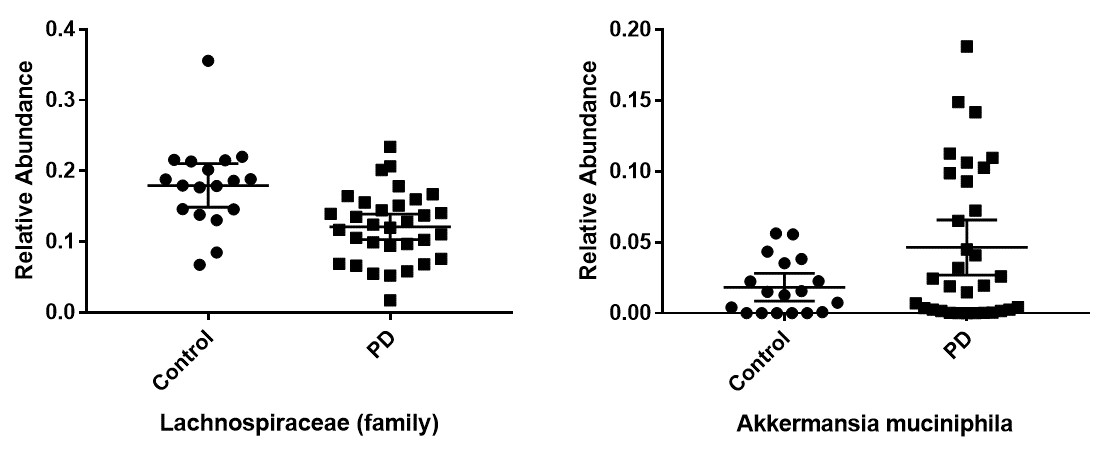Session Information
Date: Monday, October 8, 2018
Session Title: Parkinson's Disease: Non-Motor Symptoms
Session Time: 1:15pm-2:45pm
Location: Hall 3FG
Objective: To compare the gut microbiota between PD patients and matched controls in a Canadian cohort and to examine correlations between microbes and disease parameters in PD.
Background: The high incidence of gastrointestinal dysfunction in PD (e.g. constipation and small intestinal bacterial overgrowth) and the observation of α-synuclein deposition in the enteric nervous system (1) have prompted investigations into the role of the gut microbiota in this disease. Several studies have reported fecal microbiota alterations in PD; repeated observations include increases in various species of Lactobacillus and Akkermansia and reductions in beneficial Clostridia (2). To date, associations between differentially abundant microbes and specific disease features remain sparse.
Methods: We have recently completed recruitment of a large cohort (n=97 PD patients and 59 matched controls) who have provided fecal samples, serum, and data on numerous demographic and disease measures, including comorbidities and factors relating to the microbiota such as diet, pet ownership and antibiotic use. 16S rDNA amplicon sequencing will be used to identify microbial populations. Analysis will be performed using QIIME2 and Phyloseq in R.
Results: Preliminary analysis of the first 50 participants (n=32 PD, 18 controls) reveals a decreased abundance of Lachnospiraceae among PD patients (mean = 12% vs 18% in controls), a bacterial family containing anti-inflammatory butyrate-producing species thought to promote colonic health. Patients also show an increase abundance of Akkermansia muciniphila (4.6% vs 1.8%), a mucin-degrading bacterium with potential roles in metabolic function. While the decrease in Lachnospiraceae in PD appears to be a general phenomenon, the increase in Akkermansia is driven by a subgroup of patients with uncharacteristically high abundance [figure1]. Within PD, Lachnospiraceae abundance positively correlates with age and is lower in those with irritable bowel syndrome; meanwhile those with elevated Akkermansia are more likely to be taking constipation medication.
Conclusions: The gut microbiota differs between PD patients and controls, and certain microbes correlate with disease features in PD. Samples from the full cohort have been submitted for sequencing with results expected in the coming weeks. We expect these results to further inform our preliminary findings and to allow us to make novel observations in this area.
References: 1. Fasano et al. Gastrointestinal dysfunction in PD. Lancet Neurol 2015. 2. Sherwin et al. Recent developments in understanding the role of the gut microbiota in brain health and disease. Ann NY Acad Sci 2016.
To cite this abstract in AMA style:
M. Cirstea, E. Golz, B. MacVicar, B. Finlay, S. Cresswell. The Gut Microbiota in a Canadian Parkinson’s Disease Cohort [abstract]. Mov Disord. 2018; 33 (suppl 2). https://www.mdsabstracts.org/abstract/the-gut-microbiota-in-a-canadian-parkinsons-disease-cohort/. Accessed April 18, 2025.« Back to 2018 International Congress
MDS Abstracts - https://www.mdsabstracts.org/abstract/the-gut-microbiota-in-a-canadian-parkinsons-disease-cohort/

